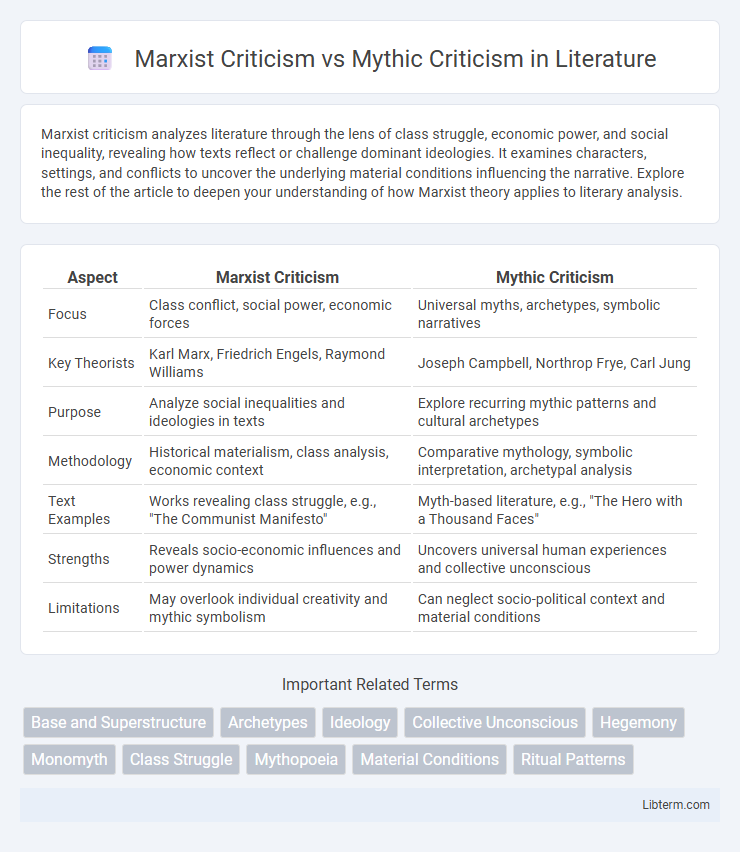Marxist criticism analyzes literature through the lens of class struggle, economic power, and social inequality, revealing how texts reflect or challenge dominant ideologies. It examines characters, settings, and conflicts to uncover the underlying material conditions influencing the narrative. Explore the rest of the article to deepen your understanding of how Marxist theory applies to literary analysis.
Table of Comparison
| Aspect | Marxist Criticism | Mythic Criticism |
|---|---|---|
| Focus | Class conflict, social power, economic forces | Universal myths, archetypes, symbolic narratives |
| Key Theorists | Karl Marx, Friedrich Engels, Raymond Williams | Joseph Campbell, Northrop Frye, Carl Jung |
| Purpose | Analyze social inequalities and ideologies in texts | Explore recurring mythic patterns and cultural archetypes |
| Methodology | Historical materialism, class analysis, economic context | Comparative mythology, symbolic interpretation, archetypal analysis |
| Text Examples | Works revealing class struggle, e.g., "The Communist Manifesto" | Myth-based literature, e.g., "The Hero with a Thousand Faces" |
| Strengths | Reveals socio-economic influences and power dynamics | Uncovers universal human experiences and collective unconscious |
| Limitations | May overlook individual creativity and mythic symbolism | Can neglect socio-political context and material conditions |
Introduction to Literary Criticism
Marxist criticism analyzes literature through the lens of class struggle, economic power, and social inequality, emphasizing how texts reflect and perpetuate ideological dominance. Mythic criticism explores literature by uncovering universal symbols, archetypes, and myths rooted in collective human experience, highlighting timeless narratives and cultural patterns. Both approaches offer distinct frameworks within literary criticism for understanding texts' social significance and archetypal resonance.
Defining Marxist Criticism
Marxist Criticism analyzes literature through the lens of class struggle, economic power, and social ideology, revealing how texts expose or reinforce capitalist systems and class conflicts. Rooted in Karl Marx's theories, it interprets literature as a product shaped by economic conditions and social relations. This approach contrasts with Mythic Criticism, which explores universal symbols and archetypes within cultural myths rather than economic or class-based structures.
Defining Mythic Criticism
Mythic criticism analyzes literature through universal myths and archetypes, emphasizing recurring motifs that reveal collective human truths and cultural narratives. It interprets characters, events, and symbols as manifestations of timeless myths, providing insight into shared psychological and societal patterns. Unlike Marxist criticism, which focuses on class struggle and socioeconomic power dynamics, mythic criticism uncovers the symbolic and mythological dimensions underlying a text's meaning.
Historical Origins and Development
Marxist Criticism originated in the 19th century, rooted in the works of Karl Marx and Friedrich Engels, focusing on class struggles, economic power, and ideological control in literature. Mythic Criticism emerged from the early 20th century, influenced by scholars like Joseph Campbell and Carl Jung, analyzing universal symbols, archetypes, and myths in texts to uncover shared human experiences. Both theories developed as interpretive frameworks but diverged in historical emphasis: Marxism centers on socio-economic conditions, while Mythic Criticism explores timeless narrative patterns.
Key Theorists and Influences
Marxist Criticism is shaped by key theorists such as Karl Marx and Friedrich Engels, emphasizing class struggle, economic power, and material conditions as central to literary analysis. Mythic Criticism draws on the works of Joseph Campbell and Carl Jung, focusing on universal archetypes, myths, and the collective unconscious to interpret texts. Both approaches influence literature by providing frameworks that reveal underlying social dynamics or timeless mythological patterns.
Core Principles of Marxist Criticism
Marxist Criticism centers on analyzing literature through the lens of class struggle, economic power, and social inequality, emphasizing how texts reflect or challenge capitalist ideologies. Its core principles include the critique of materialism, the role of literature in perpetuating or resisting dominant class structures, and the exploration of ideology as a tool for control. Mythic Criticism, in contrast, focuses on universal symbols and archetypes, interpreting narratives based on shared cultural myths rather than socioeconomic conditions.
Core Principles of Mythic Criticism
Mythic Criticism centers on the universal patterns and archetypes found across myths, emphasizing how they reveal timeless truths about human nature and cultural values. Core principles include the analysis of recurring symbols, heroic journeys, and moral dichotomies, which serve to connect individual narratives to collective unconscious themes. Unlike Marxist Criticism, which focuses on class struggle and socio-economic forces, Mythic Criticism explores the symbolic and ritualistic dimensions embedded within literature.
Comparing Analytical Approaches
Marxist Criticism analyzes texts through the lens of class struggle, economic power, and social inequality, emphasizing the material conditions that shape literature and its production. Mythic Criticism focuses on universal symbols, archetypes, and mythological patterns that transcend individual cultures, seeking to uncover inherent human experiences embedded in narratives. While Marxist Criticism critiques socio-economic structures and ideology, Mythic Criticism explores collective unconscious and timeless motifs, offering contrasting yet complementary analytical approaches to understanding texts.
Strengths and Limitations of Each Method
Marxist Criticism excels at uncovering socioeconomic power structures and class struggles within literary texts, providing deep insights into historical and material conditions shaping narratives. Its limitation lies in sometimes reducing complex characters and themes to mere reflections of economic forces, neglecting psychological or cultural dimensions. Mythic Criticism strengths lie in revealing universal archetypes and timeless patterns, enriching interpretation through symbolic and mythological frameworks, but it may overgeneralize specific cultural contexts and ignore socio-political influences embedded in the text.
Conclusion: Synthesis and Contemporary Relevance
Marxist Criticism and Mythic Criticism converge in their exploration of underlying societal narratives and power structures, highlighting how economic forces and archetypal myths shape cultural understanding. Both approaches remain relevant in contemporary analysis by uncovering the ideological frameworks that influence literature, media, and social discourse. Synthesizing these perspectives enables a deeper comprehension of how myths perpetuate class ideologies and how economic realities inform collective storytelling.
Marxist Criticism Infographic

 libterm.com
libterm.com